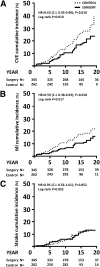Cardiovascular events after bariatric surgery in obese subjects with type 2 diabetes
- PMID: 22855732
- PMCID: PMC3507566
- DOI: 10.2337/dc12-0193
Cardiovascular events after bariatric surgery in obese subjects with type 2 diabetes
Abstract
Objective: Obese individuals with type 2 diabetes have an increased risk of cardiovascular disease. The effect of bariatric surgery on cardiovascular events in obese individuals with type 2 diabetes remains to be determined. The Swedish Obese Subjects (SOS) study is a prospective, controlled intervention study that examines the effects of bariatric surgery on hard end points. The aim of the present study was to examine the effect of bariatric surgery on cardiovascular events in the SOS study participants with type 2 diabetes.
Research design and methods: All SOS study participants with type 2 diabetes at baseline were included in the analyses (n = 345 in the surgery group and n = 262 in the control group). Mean follow-up was 13.3 years (interquartile range 10.2-16.4) for all cardiovascular events.
Results: Bariatric surgery was associated with a reduced myocardial infarction incidence (38 events among the 345 subjects in the surgery group vs. 43 events among the 262 subjects in the control group; log-rank P = 0.017; adjusted hazard ratio [HR] 0.56 [95% CI 0.34-0.93]; P = 0.025). No effect of bariatric surgery was observed on stroke incidence (34 events among the 345 subjects in the surgery group vs. 24 events among the 262 subjects in the control group; log-rank P = 0.852; adjusted HR 0.73 [0.41-1.30]; P = 0.29). The effect of surgery in reducing myocardial infarction incidence was stronger in individuals with higher serum total cholesterol and triglycerides at baseline (interaction P value = 0.02 for both traits). BMI (interaction P value = 0.12) was not related to the surgery outcome.
Conclusions: Bariatric surgery reduces the incidence of myocardial infarction in obese individuals with type 2 diabetes. Preoperative BMI should be integrated with metabolic parameters to maximize the benefits of bariatric surgery.
Trial registration: ClinicalTrials.gov NCT01479452.
Figures

Comment in
-
S.O.S.Diabetes Care. 2012 Dec;35(12):2424-5. doi: 10.2337/dc12-1351. Diabetes Care. 2012. PMID: 23173129 Free PMC article. No abstract available.
References
-
- Flegal KM, Carroll MD, Ogden CL, Curtin LR. Prevalence and trends in obesity among US adults, 1999-2008. JAMA 2010;303:235–241 - PubMed
-
- Must A, Spadano J, Coakley EH, Field AE, Colditz G, Dietz WH. The disease burden associated with overweight and obesity. JAMA 1999;282:1523–1529 - PubMed
-
- Sjöström L, Lindroos AK, Peltonen M, et al. Swedish Obese Subjects Study Scientific Group Lifestyle, diabetes, and cardiovascular risk factors 10 years after bariatric surgery. N Engl J Med 2004;351:2683–2693 - PubMed

